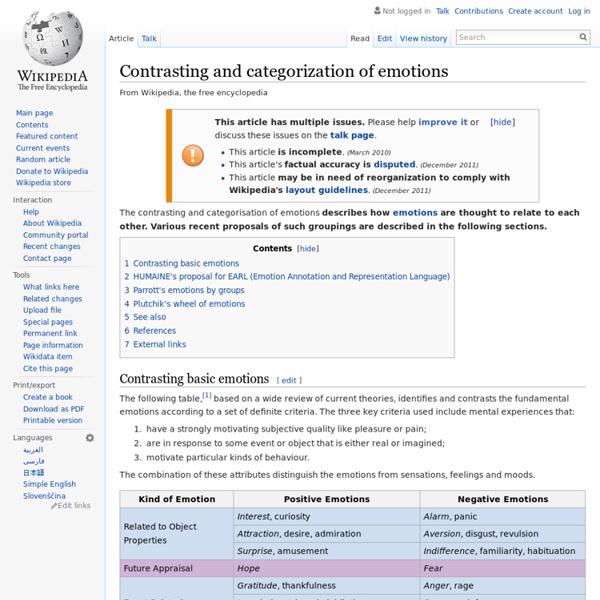Emotion classification
Emotion classification, the means by which one emotion is distinguished from another, is a contested issue in emotion research and affective science. The classification of emotions has been researched from two fundamental viewpoints: one, that emotions are discrete and fundamentally different constructs; or two, that emotions can be characterized on a dimensional basis in groupings. Emotions as discrete categories[edit] Basicality Debate[edit] Humans' subjective experience is that emotions are clearly recognizable in ourselves and others.
pain onomatopoeia
Pain aaugh Exclaimation of dismay, commonly used, and originaly created by the Peanuts gang by Charles Schulz. Used frequently by Charlie Brown in the following situations: Losing a Baseball game, Having the football pulled away by Lucy, In an embarrassing situation. Also used by other members of the peanuts gang and can be used as a roaring sound to scare someone. 1) Linus: I told her about how you're madly in love with her, Charlie Brown: Aaugh!!
The Search for Basic Emotions
Table of Contents Before reading this you might want to explore your own emotions. One way to help a person do this is to study this web page: Understand, Identify Release Your Emotions. It was written by Mary Kurus. When you return to this page you can explore how you might want to classify your emotions.
150 Resources to Help You Write Better, Faster, and More Persuasively
It doesn't matter if you're a student or a professional writer: there's always something new to learn and ways to make your writing more refined, better researched, and more effective. Writing is essential for students who want to succeed, whether they're enrolled in one of the top online colleges or an Ivy League university. As essential as it is, learning to write well isn't easy. The best practices for writing and research can sometimes be subjective, and the finer points of syntax and style often take a backseat to looming deadlines and strict citation guidelines.
Understanding Stress: Symptoms, Signs, Causes, and Effects
What is stress? The Body’s Stress Response When you perceive a threat, your nervous system responds by releasing a flood of stress hormones, including adrenaline and cortisol. These hormones rouse the body for emergency action.
10 Writing Tips from the Masters
As the world becomes increasingly digital, writing becomes more important. This is especially true for non-writers. If you work in an office, the majority of your communications are made with text by email or IM.Whether you like it or not, your ability to exchange ideas, collaborate with others, and ultimately succeed, hinges on the ability to write effectively.Earlier this week, K.
List of Emotions - Human Emotional Chart
This list of human emotions plots the descending spiral of life from full vitality of the energy of life and high consciousness through half-vitality and half-consciousness down to death. This list of emotions chart also enables to both predict and understand human behavior in all manifestations, making possible to predict the behavior of a potential spouse, a business partner, employee or friend - before you commit to a relationship. Numbers assigned to this list of emotions chart are arbitrary to show a relative degree or intensity of perceived emotion of happiness in accordance to available creative power or life's energy to the individual. Happiness encompasses a whole range of emotions from certain energy frequency level (4.0 enthusiasm level in our chart below) and up. - What we call the Happiness Domain. Neuroscientist Richard J. Davidson, Ph.D., described it well when he said: happiness “is a kind of a placeholder for a constellation of positive emotional states."
10 Steps to Finding Your Writing Voice
Bonus: Need help finding your writing voice? Click here for free tips. I write only because / There is a voice within me / That will not be still.–Sylvia Plath
Recognize these emotions
The Passion and Reason 15 The book Passion and Reason provides clear definitions and descriptions of 15 separate emotions. These are: Anger — Conspecific threat, trespass, loss attributed to an agent, unjust insult, thwarted goals, plea for justice Envy — Desiring other's stature objects Jealousy — Threat to sexual access. Fright — Concern for a future specific unpleasant event. Anxiety — Concern for an unidentified unpleasant event.
10 Writing Rules You Can't Break...And How to Break Them
A guest post by Eric Cummings of On Violence First, there was the “old school.” A bunch of stubborn grammarians got together and decided what defined “proper English.” Don’t end sentences with prepositions, never begin a sentence with “and” or “but,” and never split infinitives.
Basic Emotions
Explanations > Emotions > Basic Emotions List of emotions | So what List of emotions
10 More Websites That Help Cure Writer’s Block With Writing Prompts
From jumping into the shower to using voice recognition software, these famous authors (some Booker Prize awardees) have their own idiosyncrasies. But all of them seem to agree on one hurdle: the dread of writer’s block. Most of us are nowhere near those heights, but we do our own form of writing, like blog posts or simple journaling. Even then, sometimes the words just refuse to come. That’s when writing prompts can help.
a concise guide to important grammar, punctuation, and writing style rules
This site is a concise guide to some of the most commonly violated rules of writing, grammar, and punctuation. It is intended for all writers as an aid in the learning and refining of writing skills. Explore each of The Rules to see examples of its application and find references that provide additional explanations and examples on the Web and in print.



